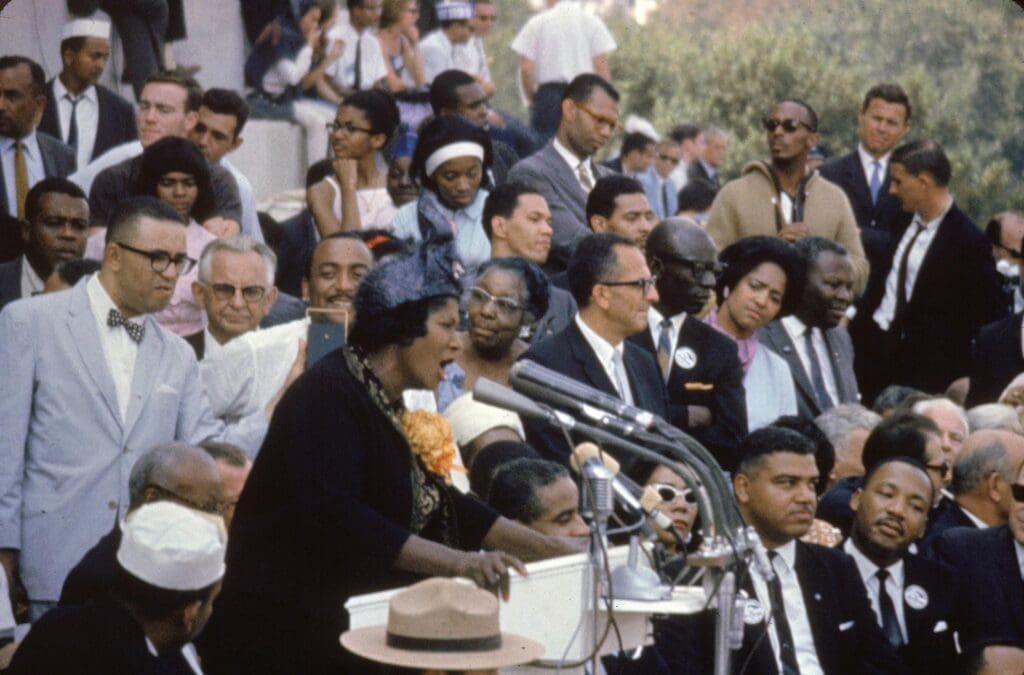Every now and then, a voice can matter. Mahalia Jackson had one of them.
Known around the world as the “Queen of Gospel,” Jackson used her powerful voice to work in the Civil Rights Movement. Starting in the 1950s, she traveled with Rev. Martin Luther King Jr. throughout the South and heard him preach in Black churches about a vision that only he could see.
But on Aug. 28, 1963, on the steps of the Lincoln Memorial, something didn’t quite sound right to Jackson as she listened to King deliver his prepared speech. King was reading from his prepared remarks when she made a simple suggestion.
“Tell them about the dream, Martin,” she urged King, “tell them about the dream.”
Inspired, King cast aside his prepared remarks and ad-libbed from his heart. For the estimated 250,000 who joined the March on Washington for Jobs and Freedom that day, they heard King deliver one of his seminal sermons.
“I have a dream,” King preached, “that one day this nation will rise up and live out the true meaning of its creed: We hold these truths to be self-evident, that all men are created equal.”
Though most memorable, King’s voice wasn’t the only one that day 60 years ago. The other voice, the one King listened to and heeded, belonged to Mahalia Jackson.
“A voice like hers comes along once in a millennium,” King once said.
Born on Oct. 26, 1911, in New Orleans, Jackson had a contralto voice that first won fame as a gospel singer in the choir at Greater Salem Baptist Church on Chicago’s South Side during the 1940s.
Among her earliest hit recordings were “I Can Put My Trust in Jesus,” “In the Upper Room,” “He’s Got the Whole World in His Hands,” “Move On Up A Little Higher” and “Even Me Lord.”
Before long, Jackson was appearing in major concert venues in the U.S. and Europe. In 1956, she was the first gospel singer to perform at Carnegie Hall. In 1961, Jackson sang at the inauguration of President John F. Kennedy. The popular “Ed Sullivan Show” made Jackson a household name by frequently asking her to perform.
But international fame did not make Jackson forget her religious upbringing and commitment to fight for equal rights.
In “As the Spirit Moves Mahalia,” prominent Black writer Ralph Ellison wrote about the meaning of Jackson’s voice.
“The true function of her singing is not simply to entertain,” he explained, “but to prepare the congregation for the minister’s message, to make it receptive to the spirit, and with effects of voice and rhythm to evoke a shared community of experience.”
Ellison further wrote that Jackson was “not primarily a concert singer but a high priestess in the religious ceremony of her church.”
Jackson and King first met at the National Baptist Convention in Alabama in 1956. King asked her if she could support his work there by singing and inspiring civil rights activists during the 381-day Montgomery Bus Boycott.
From there, she became the first woman to serve on the board of the Southern Christian Leadership Conference, a prominent civil rights group led by King, and became one of King’s most trusted advisers. In a 1962 press release, King wrote that Jackson “has appeared on numerous programs that helped the struggle in the South, but now she has indicated that she wants to be involved on a regular basis.”
She shared his vision for breaking down the barriers of segregation and fighting for equitable treatment for African Americans. In her own right, Jackson became a visible fixture within the Civil Rights Movement.
Jackson died in 1972 at the age of 60.
If music was the soul of the movement, strategic thinking was at its core. As psychologist Asa Hilliard later explained, among those strategies were moral suasion, litigation, grassroots organizing, civil disobedience, economic boycotts, the solicitation of corporate sponsors and the use of television.
The March on Washington was considered the culminating event of the historic Civil Rights Movement. The march was rooted in the ideal of economic justice and intentionally held on Aug. 28 to commemorate the lynching of Emmett Till in Mississippi on the same date in 1955.
Till’s death and the subsequent acquittal of three white men charged with the brutal murder was one of the turning points of the movement.
Among the building blocks of the Civil Rights Movement was music. It spoke to the soul, and Mahalia’s gift comforted the masses. King often called her during trying times and asked her to sing to him over the telephone.
King called her “a blessing to me … and a blessing to Negroes who have learned through her not to be ashamed of their heritage.”
It was no surprise then that Jackson felt comfortable enough to make a suggestion to the civil rights leader during a sermon.
Before he appeared on the steps of the Lincoln Memorial, Jackson had sung her rendition of “I have been buked and I have been scorned” and after he finished, she sang “We Shall Overcome.”
But her most important line that day might have been, “Tell them about the dream, Martin.”
This article is republished from The Conversation, an independent nonprofit news site dedicated to sharing ideas from academic experts. If you found it interesting, you could subscribe to our weekly newsletter.
Read more: Meet Bayard Rustin, often-forgotten civil rights activist, gay rights advocate, union organizer, pacifist and man of compassion for all in trouble Black religious leaders are up front and central in US protests – as they have been for the last 200 years
Bev-Freda Jackson does not work for, consult, own shares in or receive funding from any company or organization that would benefit from this article, and has disclosed no relevant affiliations beyond their academic appointment.
